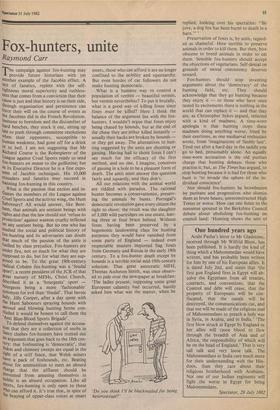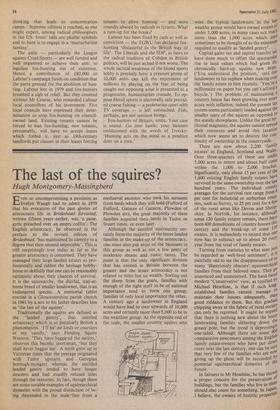Fox-hunters, unite
Raymond Carr
The campaign against fox-hunting may provide future historians with yet another example of the Jacobin effect. A sect of fanatics, replete with the self- righteous moral superiority and ruthless- ness that comes from a conviction that their cause is just and that history is on their side, through organisation and persistence can force their will on the course of events as the Jacobins did in the French Revolution. Immune to boredom and the discomfort of hard benches, they stuck it out, sitting up late to push through committee resolutions When their opponents, susceptible to human weakness, had gone off for a drink or to bed. I am not suggesting that Mr Richard Course is the Robespierre of the League against Cruel Sports ready to send fox-hunters en masse to the guillotine; but as its Executive Director he is a fine expo- nent of Jacobin techniques. His 10,000 crusaders and fanatics may succeed in banning fox-hunting in this country.
What is the passion that excites and in- flames the members of the League against Cruel Sports and the activist wing, the Hunt Saboteurs? All would answer, like Bent- ham, that animals are sentient beings with rights and that the law should not 'refuse its Protection' against wanton cruelty inflicted Gn any sentient being. But no one who has studied the social and political history of fox-hunting and its adversaries can doubt that much of the passion of the antis is fuelled by class prejudice. Fox-hunters are tinder fire, not so much for what they are stiPposed to do, but for what they are sup- posed to be. To the great 19th-century radical Cobden fox-hunting was a 'feudal Sport; a recent president of the JCR of that great nursery of MFHs, Christ Church, described it as a 'bourgeois' sport — bourgeois being a more 'fashionable' sYnonym for evil than 'feudal'. That heroic Lady, Jilly Cooper, after a day spent with the Hunt Saboteurs spraying hounds with aerosol and blowing hunting horns con- eluded it would be honest to call them the Anti Blue-Blood Sports Brigade'. To defend themselves against the accusa- l!on that they are a collection of snobs in 'alley clothes fox-hunters have trotted out an argument that goes back to the 18th cen- illrY: that foxhunting is 'democratic', that dukes and chimney sweeps are equal in the Sight of a stiff fence, that Welsh miners have a pack of foxhounds, etc. Beating about for ammunition to meet an absurd charge that the affluent should be Prevented from amusing themselves in , Public is an absurd occupation. Like all sports, fox-hunting is only open to those ‘';_ho can afford it. It's true that, in spite of tfie braying of upper-class voices at smart
meets, those who can afford it are no longer confined to the nobility and squirearchy. But even hordes of car followers do not make hunting democratic.
What is a humane way to control a population of vermin — beautiful vermin, but vermin nevertheless? To put it brutally, what is a good way of killing foxes since foxes must be killed? Here I think the balance of the argument lies with the fox- hunters. I wouldn't argue that foxes enjoy being chased by hounds, but at the end of the chase they are either killed instantly — usually their backs are broken by hounds — or they get away. The alternatives to hun- ting suggested by the antis are shooting or gassing. Having had to shoot foxes I can't say much for the efficacy of the first method, and no one, I imagine, conceives of gassing in a hole to be a pleasant form of death. The antis must answer this question fairly and squarely, and they don't.
All our relations with the animal world are riddled with paradox. The rational hunter becomes a conservationist, preserv- ing the animals he hunts. Portugal's democratic revolution gave every citizen the right to shoot: the result was the slaughter of 3,000 wild partridges on one estate, leav- ing three or four brace behind. Without foxes having been preserved by a hegemonic landowning class for hunting purposes they would have vanished from some parts of England — indeed even respectable masters imported bag foxes from Germany and Russia in the early 19th century. To a fox-hunter death except by hounds is a terrible social mid-19th-century solecism. That great autocratic MFH, Thomas Assheton Smith, was once observ- ed to pale over the newspaper at breakfast: 'The ladies present, supposing some great European calamity had occurred, hastily asked him what was the matter, when he 'Do' you think I'll be blackmailed for being heterosexual?' replied, looking over his spectacles: "By jove, a dog fox has been burnt to death in a barn." ' Preservation of foxes is, by antis, regard- ed as shameful. How terrible to preserve animals in order to kill them. But then, how obscene to breed animals in order to eat them. Sensible fox-hunters should accept the objections of vegetarians. Self-denial on grounds of moral consistency deserves reward.
Fox-hunters should stop inventing arguments about the 'democracy' of the hunting field, etc. They should acknowledge that they go hunting because they enjoy it — to those who have once tasted its excitements there is nothing in the world that can replace it — and that they are, as Christopher Sykes argued, infected with a kind of madness. A time-worn apologia is that hunting stops these madmen doing anything worse, freed by their exertions, as one mediaeval enthusiast wrote, from 'imaginations of fleshly lust'. Tired out after a hard day in the saddle you go to bed, presumably alone. An equally time-worn accusation is the old puritan charge that hunting debases those who practise it; but, as The Times has argued, to stop hunting because it is bad for those who hunt is 'to invade the sphere of the in- dividual conscience'.
Nor should fox-hunters be browbeaten by puritans and progressives who dismiss them as brute beasts, unreconstructed High Tories or worse. How can one listen to the nonsense spouted in the Berkshire Council debate about abolishing fox-hunting on council land: 'Hunting shows the sort of thinking that leads to concentration camps.' Supreme silliness is reached, as one might expect, among radical philosophers in the US: foxes' tails are phallic symbols and to hunt is to engage in a 'masturbation fantasy'.
The antis — particularly the League against Cruel Sports — are well funded and well organised to achieve their aim: to legislate fox-hunting out of existence. Hence a contribution of £80,000 to Labour's campaign funds on condition that the party pressed for the abolition of hun- ting. Labour lost in 1979 and fox-hunters breathed a sigh of relief. But they counted without Mr Course, who reminded Labour local councillors of his investment. Five local councils have expressed their deter- mination to stop fox-hunting on council- owned land. Existing tenants cannot be forced to ban fox-hunting; new tenants, presumably, will have to accept leases which forbid it, just as 19th-century landlords put clauses in their leases forcing tenants to allow hunting — and were roundly abused by radicals as tyrants. What a turn-up for the books!
Labour has been fixed by cash as well as conviction — the TGWU has declared fox- hunting 'distasteful to the British way of life'. The Liberals and the SDP, as heirs to the radical tradition of Cobden in British politics, will be just as bad if not worse. The whole tactical weakness of the blood sports lobby is precisely here: a pressure group of 10,000 antis can kill the enjoyment of millions by playing on the fear of being caught out opposing what is presented as a progressive, humanitarian crusade. To op- pose blood sports is electorally safe provid- ed coarse fishing — a proletarian sport with TV coverage — is left untouched. Fish, perhaps, are not sentient beings.
Fox-hunters of Britain, unite. Your case is sound. Go into battle, your banners emblazoned with the words of Trotsky: 'Hunting acts on the mind as a poultice does on a sore.'







































 Previous page
Previous page